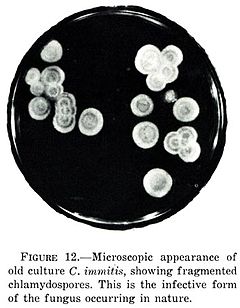Coccidioides
| Coccidioides | |
|---|---|
 |
|
| C. immitis | |
| Scientific classification | |
| Kingdom: | Fungi |
| Division: | Ascomycota |
| Class: | Eurotiomycetes |
| Order: | Onygenales |
| Family: | Onygenaceae |
| Genus: |
Coccidioides G.W.Stiles (1896) |
| Type species | |
|
Coccidioides immitis G.W.Stiles (1896) |
|
| Species | |
|
C. esteriformis |
|
C. esteriformis
C. histosporocellularis
C. immitis
C. posadasii
C. rosea
Coccidioides is a genus of dimorphic ascomycetes in the family Onygenaceae. Member species are the cause of coccidioidomycosis, also known as San Joaquin Valley fever, an infectious fungal disease largely confined to the Western Hemisphere and endemic in the Southwestern United States. The host acquires the disease by respiratory inhalation of spores disseminated in their natural habitat. The causative agents of coccidioidomycosis are Coccidioides immitis and Coccidioides posadasii. Both C. immitis and C. posadasii are indistinguishable during laboratory testing and commonly referred in literature as Coccidioides.
Coccidioidomycosis is amazingly diverse in terms of its scope of clinical presentation, as well as clinical severity. About 60% of Coccidioides infections as determined by serologic conversion are asymptomatic. The most common clinical syndrome in the other 40% of infected patients is an acute respiratory illness characterized by fever, cough, and pleuritic pain. Skin manifestations, such as erythema nodosum, are also common with Coccidioides infection. Coccidioides infection can cause a severe and difficult-to-treat meningitis in AIDS and other immunocompromised patients, and occasionally in immunocompetent hosts. Infection can sometimes cause acute respiratory distress syndrome and fatal multilobar pneumonia. The risk of symptomatic infection increases with age.
...
Wikipedia
